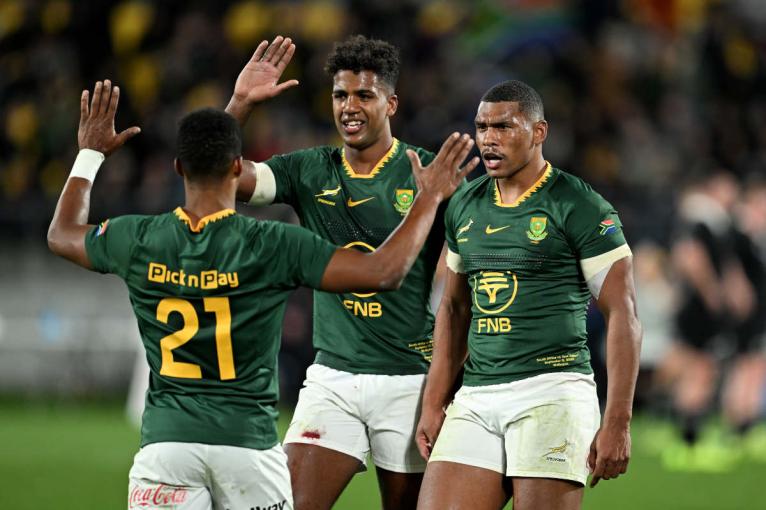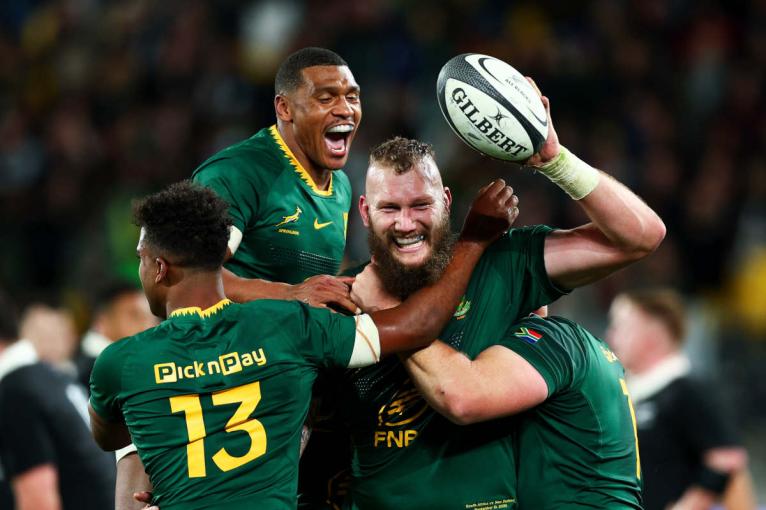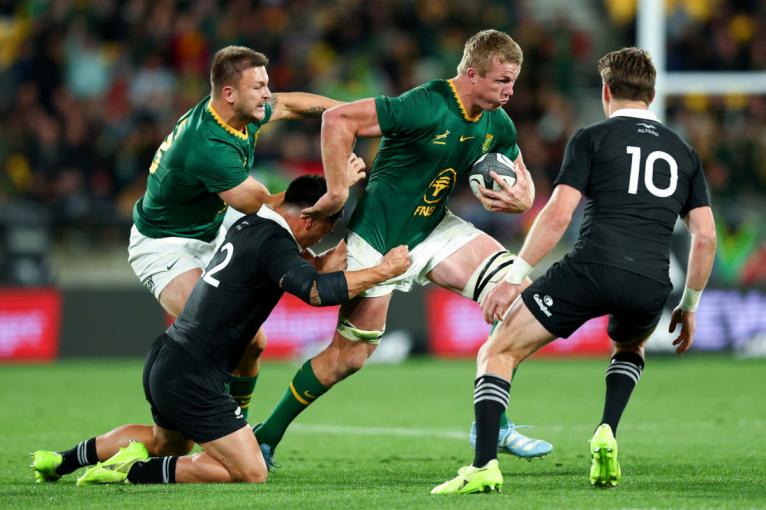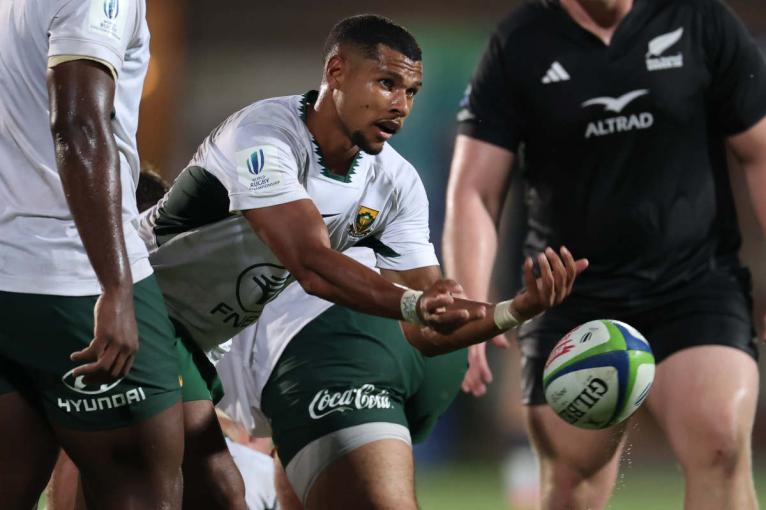Rassie Erasmus made an intriguing comment in the wake of the Springboks’ record-breaking 43-10 win against the All Blacks in Wellington on Saturday.
Going into the Freedom Cup decider, the Boks coach made seven changes to the side that lost 24-17 in Auckland.
Somewhat surprisingly, Erasmus rested double World Cup-winners such as Willie le Roux, Jesse Kriel, Damian de Allende, Handré Pollard, Eben Etzebeth and Faf de Klerk, while another decorated contingent including Frans Malherbe, Trevor Nyakane, Jean Kleyn and Kurt-Lee Arendse were unavailable due to serious injuries.
Erasmus came in for criticism after selecting a largely inexperienced back division that featured three players aged 23 and younger, namely Sacha Feinberg-Mngomezulu, Canan Moodie and first-time starter Ethan Hooker.
 Canan Moodie (centre) formed a new centre partnership with Damian Willemse in Wellington (Photo Joe Allison/Getty Images)
Canan Moodie (centre) formed a new centre partnership with Damian Willemse in Wellington (Photo Joe Allison/Getty Images)
In the end, the Boks outscored the All Blacks by six tries to one – and Moodie, Hooker and other youngsters like Jan-Hendrik Wessels were among South Africa’s best performing players.
Immediately after the game, a local broadcaster teed Erasmus up for a told-you-so statement.
Did the performance in Wellington mark the start of a new era for the Boks? Did it show how the older side that lost in Auckland was past it, and why the younger generation represents the Boks’ best shot at a third-consecutive World Cup triumph in 2027?
Erasmus took a moment to compose himself before delivering a measured response.
“We’re a group of 45 players and these were just the guys playing tonight,” he said. “They put up their hands, but we’ve got some solid guys who didn’t play tonight.”
The vast majority of the group that won the World Cup in 2019 and 2023 will be on the wrong side of 30 – and in many cases, as old as 35 – by the time the Boks touch down in Australia in 2027.
Read between the lines, and Erasmus is reluctant to cast his ageing warriors aside just yet. That speaks to the coach’s respect for both sets of age groups and his overriding quest for balance in selection.
Since the start of the World Cup cycle, Erasmus has said the age profile of the squad needs to change in the lead-up to the next global tournament.
The Boks have moved towards a more balanced approach, blending Tony Brown’s attacking shape and philosophy with a more traditional template that harnesses South Africa’s scrummaging and tactical-kicking strengths.
While the Boks still have the personnel to unleash a seven-one or six-two bench, they have favoured a five-three mix in more than half of their fixtures since the start of the 2024 season.
Much has changed, and yet, Erasmus’ quest for balance remains the same.
 Lock RG Snyman, 30, was an early replacement in Wellington and scored one of the Boks’ six tries (Photo Hagen Hopkins/Getty Images)
Lock RG Snyman, 30, was an early replacement in Wellington and scored one of the Boks’ six tries (Photo Hagen Hopkins/Getty Images)
The vast majority of the group that won the World Cup in 2019 and 2023 will be on the wrong side of 30 – and in many cases, as old as 35 – by the time the Boks touch down in Australia in 2027.
With that in mind, Erasmus has brought more youngsters through over the past two seasons, exposing a larger group of players to the Boks systems at training camps, while handing as many as 19 players Test debuts.
It’s been interesting to note how Erasmus has refused to make any declarations about his ageing stars, and how many senior players have remained with the squad over the past two years.
Many critics in South Africa – this writer included – have wondered when the Boks coach might draw a line in the sand.
Even with the likes of Feinberg-Mngomezulu, Moodie, Hooker and several other youngsters in tow, the Boks are on track to take an older squad to Australia in 2027 – as the table below shows.
RASSIE’ ERASMUS RWC SQUAD COMPARISONS BY AGE
AGE GROUP2027*2023201933 AND OLDER147430-321111326-296121525 AND YOUNGER339
*ESTIMATE BASED ON CURRENT SQUAD
Dive a little deeper into the team selections over the past few years, and it’s evident how the Boks coaches have attempted to strike a balance across the age groups.
The 2023 World Cup squad featured seven players aged 33 and older.
Nobody will dispute the fact that Duane Vermeulen and Le Roux played crucial leadership roles on and off the field at that tournament, or that ageing stars such as Deon Fourie and Nyakane stood tall in the World Cup final.
Crucially, there were 11 players between the ages of 30 and 32, and as many as 15 younger than 30.
When one considers a possible 2027 World Cup squad – based on Erasmus’ most recent selections – it’s concerning to note how much older the next group might be.
There will be a lot more competition for ‘old guard’ places in the squad, and the senior contingent that eventually travels to Australia will be exceptionally strong.
Unless further changes are made in the coming seasons, the Boks could travel to Australia with twice as many players aged 33 or older (14) – and 25 squad members aged 30 or older.
This estimate accounts for the inclusion of youngsters like Feinberg-Mngomezulu, Moodie and Hooker, as well as other recent additions like Wessels, Gerhard Steenekamp and Elrigh Louw.
The big question is how many among the old guard will feature in the final squad of 33 or 34 players.
If Erasmus were to follow the 2023 template and select seven players in this age group, it would mean leaving at least seven senior World Cup winners at home.
In some respects, it’s a healthy headache to have.
There will be a lot more competition for ‘old guard’ places in the squad, and the senior contingent that eventually travels to Australia will be exceptionally strong.
 Pieter-Steph du Toit will be 35 by the next RWC, but the flanker had another hugely influential game against New Zealand (Photo Hagen Hopkins/Getty Images)
Pieter-Steph du Toit will be 35 by the next RWC, but the flanker had another hugely influential game against New Zealand (Photo Hagen Hopkins/Getty Images)
What’s more, Erasmus will have a host of experienced options on standby, in the event of injuries.
Established players aged 30 and younger should take on more responsibility in the lead-up to 2027.
And yet, a look at the current squad shows why Erasmus and the selectors have work to do if they are going to bolster the younger age-groups and balance the experience scales.
The Boks team that faced the All Blacks in Auckland has been contrasted with the side that featured in Wellington – but there are similarities.
The backline in Wellington was undoubtedly younger and less experienced than the unit that played in Auckland, but the ages of the starting forward packs were similar, and the bench in Wellington was actually older on average, with Wessels (24) the only player younger than 28.
It’s plain to see how the selection of several youngsters hasn’t transformed the Boks into a “young” team overnight.
Erasmus may stay on for another term after the 2027 World Cup, and some of his recent squad selections suggest that he’s already thinking about the next four-year cycle.
Despite Erasmus’ outstanding efforts to bring the next generation through, there’s more to be done if South Africa are going to develop options across the younger categories.
The good news is that a host of younger players have been exposed to the Boks systems over the past few years, even if they are yet to win their first Test cap.
Lions duo Renzo du Plessis and Henco van Wyk, as well as Sharks utility back Jurenzo Julius, are promising players, and may receive a chance sooner rather than later.
Meanwhile, Quan Horn, Cameron Hanekom, Ruan Venter and Andre-Hugo Venter are all 23 or younger and have already played a Test for the Boks.
Erasmus may stay on for another term after the 2027 World Cup, and some of his recent squad selections suggest that he’s already thinking about the next four-year cycle.
Three members of the Junior Boks side who won this year’s World Rugby U20 Championship were invited to train with the senior South African squad earlier this season.
 Scrum-half Hassiem Pead was one of South Africa’s U20 world champions who spent time with the Boks squad earlier this year (Photo Timothy Rogers/Getty Images)
Scrum-half Hassiem Pead was one of South Africa’s U20 world champions who spent time with the Boks squad earlier this year (Photo Timothy Rogers/Getty Images)
Since then, winger Cheswill Jooste, scrum-half Haashim Pead and utility forward Bathobele Hlekani have gone on to represent their respective unions in the Currie Cup and may feature more prominently in the upcoming United Rugby Championship and Champions Cup campaigns.
If these players continue on their current trajectory, they may push for Boks selection over the next couple of seasons, and possibly the 2027 World Cup squad.
It’s worth remembering how Herschel Jantjies (who was then 23) and Damian Willemse (21) were picked for the 2019 tournament, and how Moodie (then 20) and Jaden Hendrikse (23) were backed to travel to France in 2023.
It will be interesting to see what Erasmus does next, once the 2025 Rugby Championship is done and dusted.
As seen in Wellington, South Africa’s next generation has the potential to be even better than the last, while some of the older players aren’t done yet.
The end-of-year tour fixtures against Japan, France, Italy, Ireland and Wales may see Erasmus showing his hand, in terms of squad balance.
While Tests against Japan, Italy and Wales may present an opportunity to rotate his squad, he may also unleash some of his younger players in marquee Tests against France and Ireland.
The Boks side that plays in Paris and Dublin may resemble the team that played in Wellington – as Erasmus moves away from a predominantly senior line-up, such as the one on duty in Auckland.
The northern hemisphere teams may sense an opportunity this November, with Erasmus juggling the quest for results with the need to build for the future.
But as seen in Wellington, South Africa’s next generation has the potential to be even better than the last, while some of the older players aren’t done yet.

